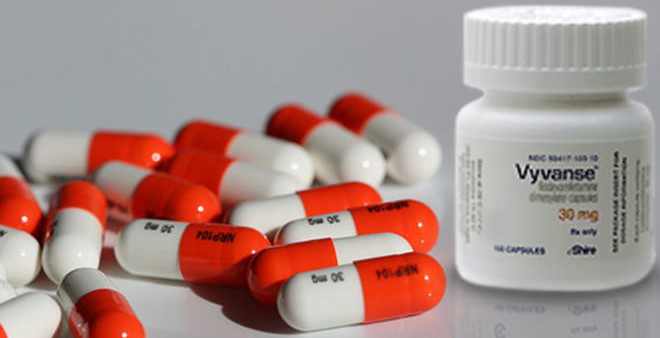
A drug commonly used to treat attention deficit hyperactivity disorder (ADHD) may also be an effective treatment for binge eating disorder, a new study finds. The results, published in the journal JAMA Psychiatry, could offer hope for the approximately 8 million Americans who suffer from the disorder.
In a randomized controlled trial, researchers found that the drug Vyvanse (lisdexamfetamine dimesylate), approved for the treatment of ADHD in children and adults, was effective in reducing binge eating episodes and compulsive eating behaviors in people diagnosed with binge eating disorder (BED). After taking the drug every day for 11 weeks, half of the study participants stopped binge eating entirely.
“These findings provide substantial preliminary evidence that lisdexamfetamine may be effective for treatment of moderate to severe BED,” the authors write. “Further investigation of lisdexamfetamine in BED is ongoing.”
Recognized as a formal diagnosis for the first time with the 2013 publication of the Diagnostic and Statistical Manual of Mental Disorders-V (DSM-V), binge eating disorder is a psychological condition characterized by consuming excessive amounts of food accompanied by a feeling of having no control, and without trying to prevent weight gain afterward through the use of laxatives of self-induced vomiting (distinguishing it from bulimia). While not all binge-eaters are overweight, the disorder is strongly associated with obesity and, as a result, is predictive of metabolic syndrome and other chronic health problems. It also frequently coincides with other mental health disorders, including depression, anxiety, post-traumatic stress disorder, body dysmorphic disorder, and substance abuse.
To date, no drug has received FDA approval for the treatment of binge eating disorder. Any use of drug therapy in binge eating disorder is considered “off-label” use and treatment decisions need to be made in consultation with a physician. Since obesity, depression and anxiety commonly occur with binge eating, drug treatment of these co-occurring disorders may result in reduction in binge eating.
In this latest study, researchers compared Vyvanse with placebo in adults with moderate to severe binge eating disorder in a randomized clinical trial from May 2011 through January 2012. Participants in the study — 255 included in an efficacy test, 259 included in a safety test — received either a dosage of 30, 50, or 70 mg/day of Vyvanse or placebo. After a three-week ramp up period, participants maintained their dose (or placebo) for eight weeks, with the researchers tracking them along the way and following up for an average of a week after the last dose.
Overall, participants receiving either 50-mg/d or 70 mg/d of Vyvanse decreased their total number of binge-eating episodes more so than participants receiving either 30 mg/d or placebo. This does not mean that patients taking placebo or the smallest dosage did not improve. In fact, one-fifth (21.3 percent) of the placebo patients stopped binge-eating for a four-week period. In comparison, half the participants who received 70-mg/day dose of Vyvanse achieved a similar four-week cessation, as did 42.2 percent of the participants receiving 50-mg/day.
There are a number of theories as to why this type of medication may be effective for people with binge eating disorder. Stimulants like Vyvanse help people suppress their impulsivity, thereby helping them to resist the urges to binge. There is a also a direct appetite suppressant effect which may make the urges less powerful. For those patients with co-occurring ADHD — which commonly overlaps with binge eating disorder — the stimulants may allow them to live a more structured life, which can include regular meals throughout the day. This makes them less prone to binge at night, the most frequent time of day for binge eating. .
The most likely explanation at the neurological level involves the balance of neurotransmitters, particularly dopamine and norepinephrine. Vyvanse and similar stimulant drugs work by acting on the dopamine and norepinephrine systems in the brain, which play an important role in regulating rewards and control. People with binge eating disorder can experience reward dysfunction and be very impulsive, similar to symptoms in people with ADHD. Norepinephrine helps with focus and concentration, while the dopamine helps recalibrate the rewards system—so the drug may help binge eaters feel more in control and able to avoid mindless eating.
Although Vyvanse show promise as a treatment for binge eating, both patients and clinicians should be aware that the drug is not without risk. Because impulsivity is part of binge eating disorder, and because patients with eating disorders are more likely to have co-morbid substance abuse disorders, the possibility of misuse needs to be closely weighed against these dangers. Furthermore, there is some evidence that patients with eating disorders are more prone to certain cardiac (heart) problems which might be worsened by stimulants.
Still, these findings are encouraging, as they suggest that Vyvanse could be used to enhance the effectiveness of other non-pharmacological treatments, some of which have shown impressive results. Cognitive behavioral therapy and psychotherapy, for instance, have been found to reduce binge-eating behavior in some patients. If Vyvanse does indeed increase patient’s feelings of cognitive control, the drug could prove to be an ideal complement to other treatment strategies.
